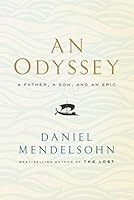
## Metadata
- Author: [[Daniel Mendelsohn]]
- Full Title: An Odyssey
- Category: #books
## Highlights
- The tales Nestor tells are examples of what are called nostos narratives. Nostos is the Greek word for “homecoming”; the plural form of this word, nostoi, was, in fact, the title of a lost epic devoted to the homecomings of the Greek kings and chieftains who fought in the Trojan War. The Odyssey itself is a nostos narrative, one that often digresses from its tale of Odysseus’ twisty voyage back to Ithaca in order to relate, in brief, the nostoi of other characters, as Nestor does here—almost as if it were anxious that those other nostoi stories would not themselves make it safely into the future. In time, this wistful word nostos, rooted so deeply in the Odyssey’s themes, was eventually combined with another word in Greek’s vast vocabulary of pain, algos, to give us an elegantly simple way to talk about the bittersweet feeling we sometimes have for a special kind of troubling longing. Literally this word means “the pain associated with longing for home,” but as we know, “home,” particularly as we get older, can be a time as well as a place. The word is “nostalgia.” ([Location 1576](https://readwise.io/to_kindle?action=open&asin=B01N1TRD02&location=1576))
- Homer’s skillful manipulation of the parallel homecomings reminds us of a familiar psychological truth: that a strong sense of what our own family is like, what its weaknesses and strengths are, the relative degrees of its conventionality and eccentricity, its normalcy or pathology, is often impossible to establish until we are old enough to compare it intelligently with the families of others; something we start doing only when we begin to perceive, as happens at the end of childhood, that our family is not, in fact, the entire world. ([Location 1677](https://readwise.io/to_kindle?action=open&asin=B01N1TRD02&location=1677))
- Maybe Daddy, too, was polytropos; maybe, as that adjective suggests so powerfully in the Odyssey, identity is less a matter of binary oppositions, the contemptuous or the kindly, the father or the husband, the father or the son, than it is of kaleidoscopic perspective. Maybe it’s a question of which section of the circle, the loop, you happen to be in a position to see. ([Location 2512](https://readwise.io/to_kindle?action=open&asin=B01N1TRD02&location=2512))
- Over time, nekyia, the word for the rites that summon these inarticulate zombies, has come to stand for the entire episode, which occurs just before the halfway point of Odysseus’ long journey home. The strategic positioning of this episode suggests an important moral: In order to move into the future, we must first reconcile ourselves with our pasts. ([Location 2849](https://readwise.io/to_kindle?action=open&asin=B01N1TRD02&location=2849))
- Don’t sweet-talk me about death, brilliant Odysseus. I’d rather serve another as a land-bound serf, some man without a portion, no livelihood, than be the lord of all the withered dead. The exchange represents a shocking rejection of the values embraced by Achilles and endorsed throughout the Iliad. For the hero of the Iliad, a poem that celebrates the dark glamour of early death, to announce to the hero of the Odyssey, a poem that celebrates the overriding drive to survive at all costs, that life at any price, life even as the servant of an indigent farmer, is preferable to glory among the dead, is both devastating and something of a dark joke. It’s as if the Iliad were saying to the Odyssey, You win. ([Location 2921](https://readwise.io/to_kindle?action=open&asin=B01N1TRD02&location=2921))
- For the best teacher is the one who wants you to find meaning in the things that have given him pleasure, too, so that the appreciation of their beauty will outlive him. In this way—because it arises from an acceptance of the inevitability of death—good teaching is like good parenting. ([Location 3617](https://readwise.io/to_kindle?action=open&asin=B01N1TRD02&location=3617))
- I smiled, thinking of all the times over the years that Froma has pushed me to do things, go places, try to see things in a new, less rigid way. I thought of something she’d said to me once when I was struggling to finish my dissertation. I’d come to her office, blocked and despairing because some big idea I’d been excited about wasn’t working out. After I finished, she fixed her eyes on me and said, Your problem is that you see everything that doesn’t fit your theory as a problem, instead of as an opportunity to enlarge your thinking, to come up with a better theory. You’re so fixated on your own ideas that you don’t see what’s right in front of your face. ([Location 4612](https://readwise.io/to_kindle?action=open&asin=B01N1TRD02&location=4612))
- You never do know, really, where education will lead; who will be listening and, in certain cases, who will be doing the teaching. ([Location 4646](https://readwise.io/to_kindle?action=open&asin=B01N1TRD02&location=4646))
- A father makes his son out of his flesh and out of his mind and then shapes him with his ambitions and dreams, with his cruelties and failures, too. But a son, although he is of his father, cannot know his father totally, because the father precedes him; his father has always already lived so much more than the son has, so that the son can never catch up, can never know everything. No wonder the Greeks thought that few sons are the equals of their fathers; that most fall short, all too few surpass them. It’s not about value; it’s about knowledge. The father knows the son whole, but the son can never know the father. I thought, No wonder Odysseus can’t lie to Laertes at the end of the poem. ([Location 4886](https://readwise.io/to_kindle?action=open&asin=B01N1TRD02&location=4886))